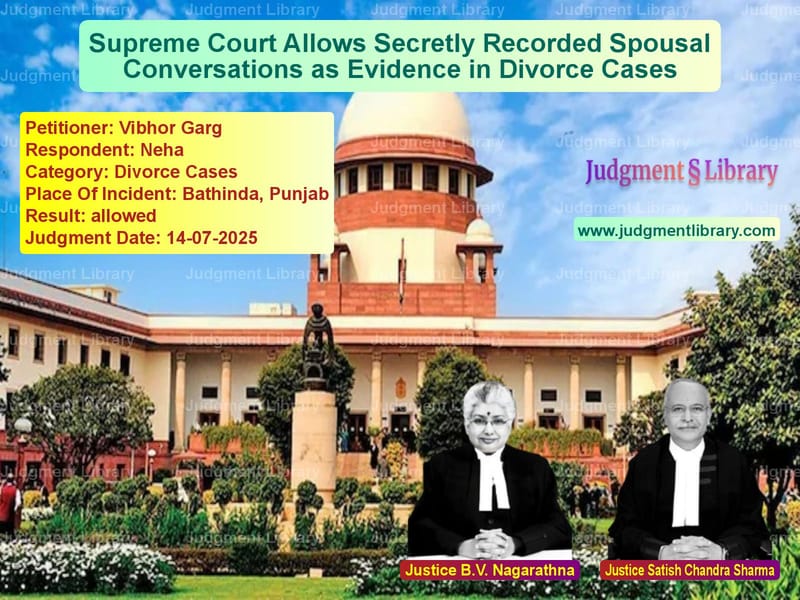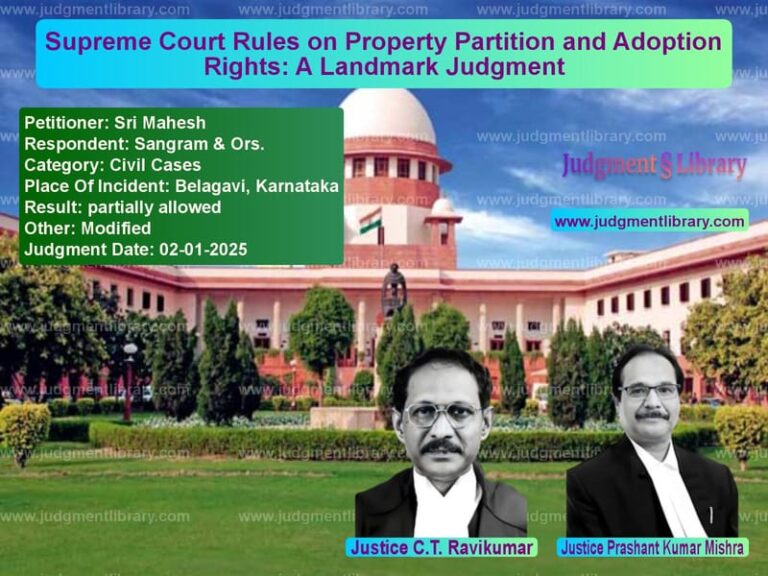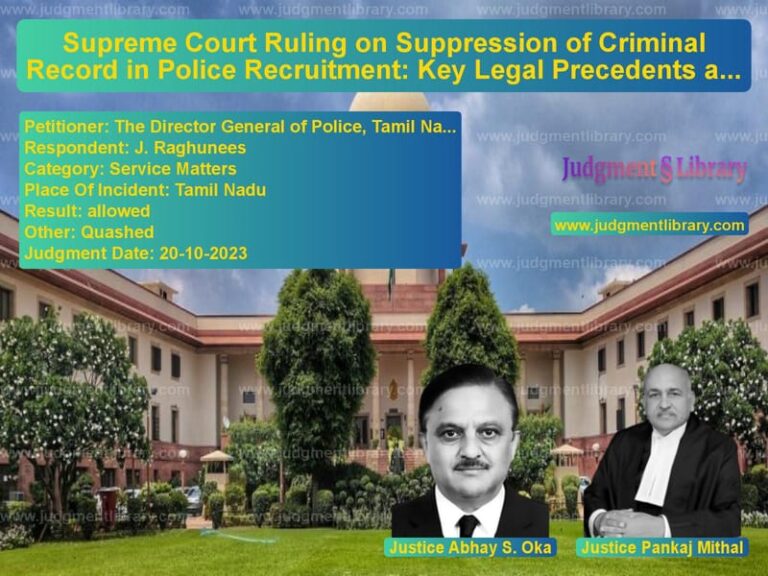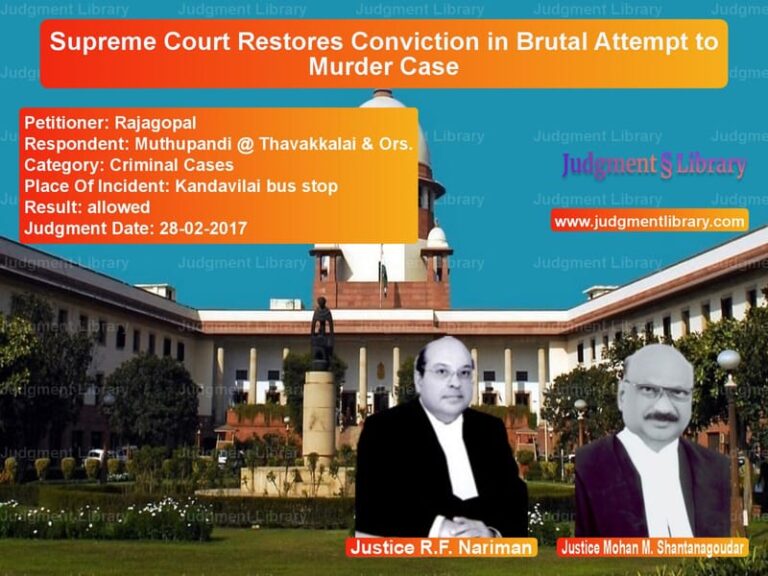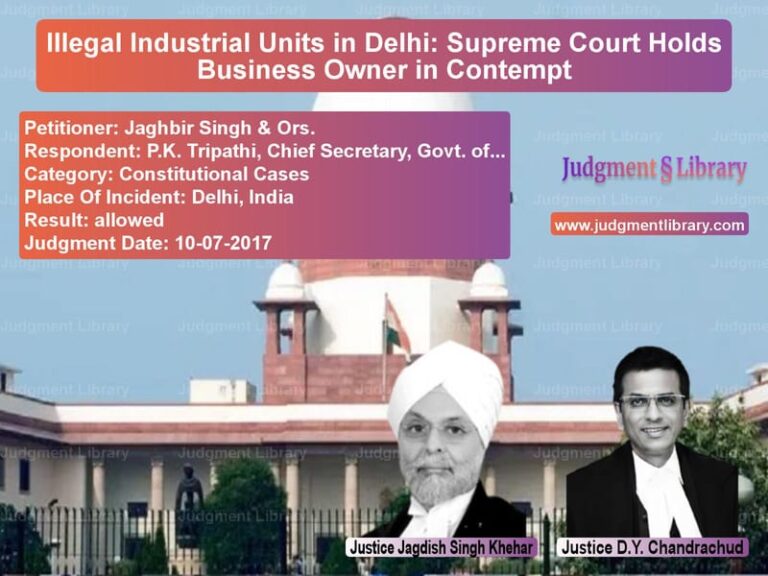Supreme Court Allows Secretly Recorded Spousal Conversations as Evidence in Divorce Cases
In a landmark judgment that balances the right to privacy with the right to fair trial in matrimonial disputes, the Supreme Court has ruled that secretly recorded conversations between spouses can be admitted as evidence in divorce proceedings. The verdict, delivered on July 14, 2025, settles a long-standing legal debate about whether such recordings violate privacy rights or constitute legitimate evidence in marital litigation.
The case originated from a divorce petition filed by Vibhor Garg against his wife Neha. During the proceedings, the husband sought to submit secretly recorded conversations from 2010 and 2016 as evidence to support his case. The Family Court in Bathinda had initially allowed this evidence, but the Punjab and Haryana High Court reversed this decision, holding that accepting such recordings would constitute a clear infringement of the wife’s right to privacy.
The Legal Battle Over Secret Recordings
The appellant-husband argued through his counsel Sri Ankit Swarup that in matrimonial proceedings involving allegations of cruelty, parties often need to present evidence of events that occurred privately within the matrimonial home. He contended that modern technology and electronic devices can help bring such evidence to court, and if privacy arguments were permitted to prevail, it would impinge upon the right to fair trial of the other spouse.
The husband’s legal team emphasized that as per the exception contained in Section 122 of the Evidence Act, the communication between married persons can be disclosed in matrimonial proceedings like divorce. They also relied on Sections 14 and 20 of the Family Courts Act, which allow Family Courts to deviate from strict rules of evidence and admit materials necessary for adjudicating disputes.
On the other side, the respondent-wife, represented by senior counsel Sri Gagan Gupta, strongly opposed the admission of these recordings. She argued that the unilateral and illegal recording of a private conversation by one spouse without informing the other spouse cannot be said to be a ‘communication’ at all and thus any such purported evidence is not admissible in law.
The wife’s legal team stressed that permission to bring such evidence on record is fraught with inherent danger as the court would never be able to ascertain the circumstances in which the alleged conversation was held. They warned that judicial recognition of such evidence would result in every married couple doubting their partner and becoming careful and apprehensive, running the risk of every conversation being recorded.
The Court’s Analysis of Section 122 of Evidence Act
The Supreme Court conducted an extensive analysis of Section 122 of the Indian Evidence Act, which deals with communications during marriage. The Court explained that this section consists of two branches: first, that a married person shall not be compelled to disclose any communication made to him during marriage by his spouse; and second, that the married person shall not, except in two special classes of proceedings, be permitted to disclose such communication unless the person who made it consents.
The Court noted that the exceptions to this rule of privilege are: (a) proceedings in suits between married persons, and (b) proceedings in which one married person is prosecuted for any crime against the other. Since the current case involves a divorce proceeding between married persons, the exception clearly applies.
The judgment elaborated that Section 122 only prevents disclosure in giving evidence by the other spouse in court of the communication made. It does not mean that other evidence, which is not barred under this Section or other provisions of the Act, is barred. The Court emphasized that the provision is neither an absolute bar on any person nor on the communication itself, but puts a specific and limited bar on a married person from disclosing the communication made to him/her by his/her spouse during the subsistence of marriage.
Right to Privacy vs Right to Fair Trial
One of the central issues before the Court was whether admitting secretly recorded conversations would violate the right to privacy recognized as a fundamental right under Article 21 of the Constitution. The Court examined this question in light of its previous judgments in K.S. Puttaswamy (Privacy-9J.) vs. Union of India and Kaushal Kishor vs. State of U.P.
The Court made a crucial distinction, observing that Section 122 of the Evidence Act does not concern itself with right to privacy vis-à-vis spouses which is evident on a reading of the Section and on discerning its plain meaning. The founding rationale for Section 122, as recognized by the Law Commission and various High Courts, was to protect the sanctity of marriage and not the right to privacy of the individuals involved.
The judgment stated that when we weigh the respective rights of the parties in a trial within the parameters of Section 122 of the Evidence Act, we do not think that there is any breach of right to privacy in the instant case. In fact, Section 122 of the aforesaid Act does not recognise such a right at all. On the other hand, the said Section carves out an exception to right to privacy between spouses and therefore cannot be applied horizontally at all.
Validity of Secretly Obtained Evidence
The Court referred to its earlier decisions in Yusufalli Esmail Nagree vs. The State Of Maharashtra and R.M. Malkani vs. State of Maharashtra, where it had held that merely the fact that evidence was not obtained strictly in accordance with law does not absolutely bar the admissibility of such evidence.
The Court reiterated the three-fold test for admitting tape-recorded conversations: first, the conversation must be relevant to the matters in issue; secondly, there must be identification of the voice; and thirdly, the accuracy of the tape recorded conversation must be proved by eliminating the possibility of erasing the tape record.
The judgment emphasized that a contemporaneous tape record of a relevant conversation is a relevant fact and is admissible under Section 7 of the Evidence Act. It is res gestae (part of the transaction) and comparable to a photograph of a relevant incident.
Technological Advancement and Evidence Law
The Court acknowledged that the Indian Evidence Act is more than a century old and obviously could not encapsulate all technologically varied challenges posed by modern technology. However, the purpose of the law of evidence is not to create barriers but to break them to ensure that a clearer picture is created in the mind of the judge to decide a dispute.
The judgment noted that in today’s day and age, when technological advancement has made it easier to record and recreate moments of past and present for reference in future, then to say that such better forms of evidence and material would not be admissible on the ground of them being in violation of the right to privacy would amount to defeating the very object of the Evidence Act.
The Court also referenced Sections 65A and 65B of the Evidence Act, which specifically deal with electronic evidence, indicating that the Parliament has recognized the importance of electronic records in modern litigation.
Court’s Final Ruling and Directions
In its concluding remarks, the Supreme Court set aside the High Court’s order and restored the Family Court’s decision allowing the evidence. The Court directed the Family Court to take on record the supplementary affidavit filed by way of examination-in-chief along with memory card/chip of the mobile phones, compact disc (CD) and transcript of the conversation recorded in memory card/chips of the mobile phones for the relevant period and consider the same as evidence, in accordance with law.
The Court made it clear that if the marriage has reached a stage where spouses are actively snooping on each other, that is in itself a symptom of a broken relationship and denotes a lack of trust between them. The said snooping cannot be said to be a consequence of the Court admitting the evidence obtained by snooping. In fact, snooping between partners is an effect and not a cause of marital disharmony.
This significant judgment provides much-needed clarity on the admissibility of electronic evidence in matrimonial disputes and strikes a careful balance between the right to privacy and the right to fair trial. It acknowledges the realities of modern relationships where technology plays an increasingly important role, while ensuring that relevant evidence is not excluded merely because it was obtained without consent in the context of a deteriorating marital relationship.
Petitioner Name: Vibhor Garg.Respondent Name: Neha.Judgment By: Justice B.V. Nagarathna, Justice Satish Chandra Sharma.Place Of Incident: Bathinda, Punjab.Judgment Date: 14-07-2025.Result: allowed.
Don’t miss out on the full details! Download the complete judgment in PDF format below and gain valuable insights instantly!
Download Judgment: vibhor-garg-vs-neha-supreme-court-of-india-judgment-dated-14-07-2025.pdf
Directly Download Judgment: Directly download this Judgment
See all petitions in Domestic Violence
See all petitions in Mutual Consent Divorce
See all petitions in Property Division in Divorce Cases
See all petitions in Dowry Cases
See all petitions in Judgment by B.V. Nagarathna
See all petitions in Judgment by Satish Chandra Sharma
See all petitions in allowed
See all petitions in supreme court of India judgments July 2025
See all petitions in 2025 judgments
See all posts in Divorce Cases Category
See all allowed petitions in Divorce Cases Category
See all Dismissed petitions in Divorce Cases Category
See all partially allowed petitions in Divorce Cases Category

